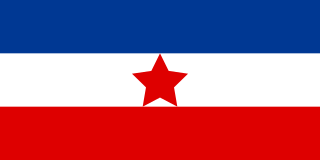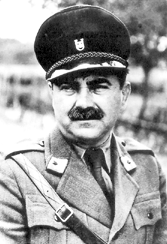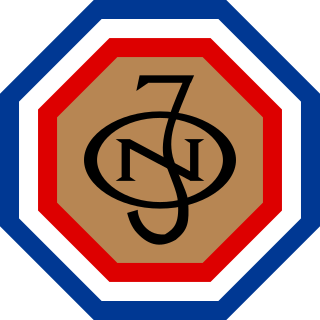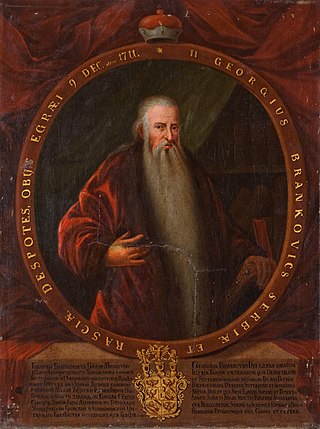Related Research Articles

Yugoslavia was a country in Southeast and Central Europe that existed from 1918 to 1992.

Democratic Federal Yugoslavia, also known as Democratic Federative Yugoslavia, was a provisional state established during World War II on 29 November 1943 through the Second Session of the Anti-Fascist Council for the National Liberation of Yugoslavia (AVNOJ). The National Committee for the Liberation of Yugoslavia (NKOJ) was its original executive body. Throughout its existence it was governed by Marshal Josip Broz Tito as prime minister.

The Corfu Declaration was an agreement between the prime minister of Serbia, Nikola Pašić, and the president of the Yugoslav Committee, Ante Trumbić, concluded on the Greek island of Corfu on 20 July 1917. Its purpose was to establish the method of unifying a future common state of the South Slavs living in Serbia, Montenegro and Austria-Hungary after the First World War. Russia's decision to withdraw diplomatic support for Serbia following the February Revolution, as well as the Yugoslav Committee's sidelining by the trialist reform initiatives launched in Austria-Hungary, motivated both sides to attempt to reach an agreement.

The Yugoslav Committee was a World War I-era unelected, ad-hoc committee largely consisting of émigré Croat, Slovene, and Bosnian Serb politicians and political activists, whose aim was the detachment of Austro-Hungarian lands inhabited by the South Slavs and unification of those lands with the Kingdom of Serbia. The group was formally established in 1915, and it last met in 1919, shortly after the breakup of Austria-Hungary and the establishment of the Kingdom of Serbs, Croats and Slovenes. The Yugoslav Committee was led by the Croat lawyer Ante Trumbić as the committee president, and Croat politician Frano Supilo as its vice president.

The League of Communists of Yugoslavia, known until 1952 as the Communist Party of Yugoslavia, was the founding and ruling party of SFR Yugoslavia. It was formed in 1919 as the main communist opposition party in the Kingdom of Serbs, Croats and Slovenes and after its initial successes in the elections, it was proscribed by the royal government and was at times harshly and violently suppressed. It remained an illegal underground group until World War II when, after the invasion of Yugoslavia in 1941, the military arm of the party, the Yugoslav Partisans, became embroiled in a bloody civil war and defeated the Axis powers and their local auxiliaries. After the liberation from foreign occupation in 1945, the party consolidated its power and established a one-party state, which existed in that form of government until 1990, two years prior to the breakup of Yugoslavia.

Mile Budak was a Croatian politician and writer best known as one of the chief ideologists of the Croatian fascist Ustaša movement, which ruled the Independent State of Croatia during World War II in Yugoslavia from 1941–45 and waged a genocidal campaign of extermination against its Roma and Jewish population, and of extermination, expulsion and religious conversion against its Serb population.

The Organization of Yugoslav Nationalists, was a political organization active in Kingdom of Serbs, Croats and Slovenes that existed from 1921 to 1929. ORJUNA supported Yugoslav nationalism, promoted the creation of a corporatist state, and opposed communism, democracy, separatism, Serbian and Croatian nationalism. It is believed to have been inspired by fascism of neighbouring Kingdom of Italy.
Tamo daleko is a Serbian folk song which was composed in 1916 to commemorate the Serbian Army's retreat through Albania in World War I and during which it was devastated by hunger, disease and attacks by armed bands before regrouping on the Greek island of Corfu, where many more Serbian soldiers died. It revolves around the theme of loss and longing for a distant homeland.
The Memorandum of the Serbian Academy of Sciences and Arts, known simply as the SANU Memorandum, was a draft document produced by a 16-member committee of the Serbian Academy of Sciences and Arts (SANU) from 1985 to 1986.

Serbian nationalism asserts that Serbs are a nation and promotes the cultural and political unity of Serbs. It is an ethnic nationalism, originally arising in the context of the general rise of nationalism in the Balkans under Ottoman rule, under the influence of Serbian linguist Vuk Stefanović Karadžić and Serbian statesman Ilija Garašanin. Serbian nationalism was an important factor during the Balkan Wars which contributed to the decline of the Ottoman Empire, during and after World War I when it contributed to the dissolution of the Austro-Hungarian Empire, and again during the breakup of Yugoslavia and the Yugoslav Wars of the 1990s.

Yugoslav irredentism was a political idea advocating merging of South Slav-populated territories within Yugoslavia with several adjacent territories, including Bulgaria, Western Thrace and Greek Macedonia. The government of the Kingdom of Yugoslavia sought the union with Bulgaria or its incorporation into Yugoslavia. Since 1945, the Socialist Federal Republic of Yugoslavia under Josip Broz Tito sought to create an integral Yugoslavia that would incorporate within its borders: Greek Macedonia and Thrace, Albania, Bulgaria, portions or entire Austrian Carinthia, and for a time the entire Italian region of Friuli Venezia Giulia.

Yugoslavism, Yugoslavdom, or Yugoslav nationalism is an ideology supporting the notion that the South Slavs, namely the Bosniaks, Croats, Macedonians, Montenegrins, Serbs and Slovenes, but also Bulgarians, belong to a single Yugoslav nation separated by diverging historical circumstances, forms of speech, and religious divides. During the interwar period, Yugoslavism became predominant in, and then the official ideology of the Kingdom of Yugoslavia. There were two major forms of Yugoslavism in the period: the regime favoured integral Yugoslavism promoting unitarism, centralisation, and unification of the country's ethnic groups into a single Yugoslav nation, by coercion if necessary. The approach was also applied to languages spoken in the Kingdom. The main alternative was federalist Yugoslavism which advocated the autonomy of the historical lands in the form of a federation and gradual unification without outside pressure. Both agreed on the concept of National Oneness developed as an expression of the strategic alliance of South Slavs in Austria-Hungary in the early 20th century. The concept was meant as a notion that the South Slavs belong to a single "race", were of "one blood", and had shared language. It was considered neutral regarding the choice of centralism or federalism.
Hrvatski Domobran was a Croat political organization that advocated independence for Croatia from Yugoslavia, and became associated with the Ustaše. It was founded in 1928 and took part in demonstrations in Zagreb in which it engaged in violent battles with police. After being shut down and forced to flee with the establishment of royal dictatorship in Yugoslavia, it was refounded as an émigré organization in 1933 in Buenos Aires, Argentina. A section was established in the United States to raise support for the Ustaše.

The May Declaration was a manifesto of political demands for unification of South Slav-inhabited territories within Austria-Hungary put forward to the Imperial Council in Vienna on 30 May 1917. It was authored by Anton Korošec, the leader of the Slovene People's Party. The document was signed by Korošec and thirty-two other council delegates representing South-Slavic lands within the Cisleithanian part of the dual monarchy – the Slovene Lands, the Dalmatia, Istria, and the Condominium of Bosnia and Herzegovina. The delegates who signed the declaration were known as the Yugoslav Club.

Serbian historiography refers to the historiography of the Serb people since the founding of Serbian statehood. The development can be divided into four main stages: traditional historiography, Ruvarac's critical school, Communist–Marxist legacy, and the renewed Serbian national movement.
The Herzegovina lobby or Herzegovinian lobby is a disputed term that emerged in Croatia in the 1990s for the alleged disproportional influence of Croats from the Herzegovina region of Bosnia and Herzegovina on the politics of Croatia. At times it has been described it as a major factor in contemporary Croatian politics and the most powerful lobby in Croatia, it is also viewed as a stereotype, pejorative, and nonexistent.

The Niš Declaration was a document issued on 7 December 1914, in the midst of World War I, in which the government of the Kingdom of Serbia formally declared its wartime objectives. Published during the Battle of Kolubara as a defensive declaration seeking to attract support from the South Slavs living in Austria-Hungary, it contained a promise to work for the liberation of South Slavs from foreign rule and the establishment of a common South Slavic state after the war. As the Serbian government had withdrawn from Belgrade earlier in the conflict, the declaration was adopted in the temporary Serbian capital of Niš.

Slovenia–Turkey relations are the foreign relations between Slovenia and Turkey. Slovenia has an embassy in Ankara. Turkey has an embassy in Ljubljana. Both countries are members of the Council of Europe and NATO. Slovenia is a member of the European Union, Turkey is not a member.
The Zagreb Resolution was a political declaration on the need for political unification of the Croats, the Slovenes and the Serbs living in Austria-Hungary. It was adopted by representatives of opposition political parties in the Kingdom of Croatia-Slavonia presided by Ante Pavelić in a meeting held in Zagreb on 2–3 March 1918. The declaration relied on the right of self-determination and called for establishment of an independent democratic state respecting rights of individuals and historically established polities joining the political union. It also called for ensuring cultural and religious equality in such a union. The Zagreb Resolution established a preparatory committee tasked with establishment of the National Council of Slovenes, Croats and Serbs intended to implement the resolution. The National Council was established on 5 October in proceedings described by Pavelić as a continuation of the Zagreb conference that March.

The Croatian state right is a legal concept in Croatian law representing the entirety of written and customary rules on the establishment and functioning of public authorities in Croatia. It also refers to the legal status of Croatia as an independent polity or within the framework of various states Croatia was a part of through the history. Application of the doctrine of the Croatian state right in practice is pointed out as the evidence of continuous statehood of Croatia since the medieval Kingdom of Croatia. The Croatian state right as a source of sovereignty is listed in the preamble of the modern Constitution of Croatia.
References
- 1 2 3 4 Carter, Daniela. "Sabrina P. Ramet curriculum vitae". docplayer.net.
- 1 2 3 Djokić, Dejan (April 2008). "Sabrina P. Ramet: The Three Yugoslavias: State-Building and Legitimation, 1918–2005". The American Historical Review. 113 (2): 609–610. doi:10.1086/ahr.113.2.609.
- 1 2 3 4 5 "Sabrina Petra Ramet, Professor". Norwegian University of Science and Technology. Retrieved 19 May 2017.
- ↑ Ramet, Pedro. "Ramstein airman is prolific artist", The Stars and Stripes , European Edition, Darmstadt, Hesse, Germany, volume 32, number 234, December 8, 1973, page 9. Note: this article was written by Sergeant Pedro Ramet.
- ↑ Kürti, László (1 July 2006). "A Review of: "Whose Democracy? Nationalism, Religion, and the Doctrine of Collective Rights in Post-1989 Eastern Europe"". Terrorism and Political Violence . 18 (2): 359–360. doi:10.1080/09546550600663591. ISSN 0954-6553. S2CID 147652725.
- ↑ Levgold, Robert (February 2007). "Review: The Three Yugoslavias: State-Building and Legitimation, 1918-2005". Foreign Affairs . Retrieved 5 January 2017.
- ↑ Lukic, R. (1 November 2007). "Review of Ramet's The Three Yugoslavias: The Three Yugoslavias: State-Building and Legitimation, 1918-2005 by Sabrina P. Ramet. Washington, DC, and Bloomington: Woodrow Wilson Center Press and Indiana University Press, 2006". East European Politics and Societies . 21 (4): 726–733. doi:10.1177/0888325407307283. S2CID 143720694.
- ↑ Stokes, Gale (1 June 2008). "Sabrina P. Ramet, The Three Yugoslavias: State-Building and Legitimation, 1918–2005". The Journal of Modern History . 80 (2): 470–471. doi:10.1086/591598. ISSN 0022-2801.
- ↑ Djilas, Aleksa (3 December 2007). "The academic West and the Balkan test" (PDF). Journal of Southern Europe and the Balkans. 9 (3): 323–328. doi:10.1080/14613190701728320. S2CID 154936884.
- ↑ Ramet, Sabrina P.; Lampe, John R. (1 April 2008). "Debates" (PDF). Journal of Southern Europe and the Balkans. 10 (1): 115–120. doi:10.1080/14613190801923276. S2CID 216141613.
- ↑ Member listing of DKNVS Group IV, sociology and political science, Dknvs.no, retrieved 2017-01-05.
- ↑ Member listing of DNVA Group 7: social studies Archived 6 January 2017 at the Wayback Machine , Dnva.no, retrieved 2017-01-05.